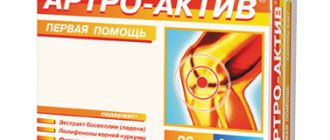Indications for use of Baralgin
What does Baralgin help with? Most often, the medication is prescribed to relieve pain of mild to moderate intensity:
- neuralgia;
- migraine headache;
- radiculitis;
- osteochondrosis;
- menalgia;
- arthritis;
- toothache.
What else can Baralgin tablets be prescribed for? The medication is used to relieve spasms of smooth muscle tissue:
- biliary colic (with cholelithiasis , cholecystitis );
- intestinal colic (with pathology of the digestive tract);
- renal colic (with ICD , pyelonephritis ).
Indications for the use of Baralgin as part of combination therapy for infectious and inflammatory pathologies:
- febrile conditions;
- low-grade fever.
Special instructions for the use of the drug Baralgin
The drug should not be used for mild complaints. Baralgin is prescribed with caution, only under strict indications and subject to appropriate medical supervision and care, to patients with systolic pressure below 100 mmHg. or unstable hemodynamics (for example, circulatory failure as a result of myocardial infarction, multiple wounds, shock), as well as in patients with disorders of the hematopoietic system (for example, as a result of treatment with cytotoxic drugs). An increased risk of developing attacks of suffocation and shock when taking Baralgin occurs in patients with bronchial asthma, chronic infectious and inflammatory diseases of the respiratory tract; having symptoms similar to hay fever, chronic urticaria; suffering from frequent conjunctivitis or rhinosinusitis. The same applies to patients who have a history of hypersensitivity reactions to non-drug substances (for example, food, preservatives, furs, hair dye), as well as patients who have previously had reactions in the form of sneezing, watery eyes and severe redness of the face in response to ingestion of small amounts of alcohol. This also applies to patients who have severe pain or suffer from rheumatism, who have increased sensitivity to any NSAIDs and analgesics-antipyretics. The risk of developing shock is significantly higher after intravenous administration of Baralgin than after oral administration. Before prescribing the drug, the doctor should find out the patient’s allergy history and assess his condition. If the patient has had a hypersensitivity reaction to Baralgin, he should be warned not to take drugs containing pyrazolone in the future. If agranulocytosis is suspected, a detailed clinical blood test should be performed and Baralgin should be immediately stopped, even if the patient recovers. If thrombocytopenia develops, you should also stop taking the drug. In the event of an unexpected deterioration in the patient’s general condition, manifested by a stable high temperature or a significant increase in it, inflammation of the mucous membrane, especially in the mouth, nose and throat, treatment with Baralgin should be stopped immediately, because the above symptoms may be associated with the development of agranulocytosis. When taking Baralgin, there was no effect on the ability to drive a car or operate machinery. Although experimental studies have not revealed a negative effect of metamizole sodium on the fetus, the use of Baralgin in the 1st trimester and in the last 6 weeks of pregnancy is not recommended. Metamizole may inhibit platelet growth in the fetus. In addition, as a result of inhibition of prostaglandin synthesis, premature closure of the ductus botallus in the fetus may occur. During other periods of pregnancy, the drug can be prescribed only according to strict indications, under the supervision of a doctor. Excretion of the Baralgin biotransformation product in urine can cause red coloration of urine, which has no clinical significance and disappears after discontinuation of the drug. During treatment with Baralgin, it is possible to obtain obviously lower results for determining blood sugar when using the glucose oxidase method.
List of pharmacies where you can buy Baralgin:
- Moscow
- Saint Petersburg
Contraindications
- diseases accompanied by bronchospasm ;
- bronchial asthma;
- pregnancy;
- deficiency of the enzyme glucose-6-phosphate dehydrogenase;
- hepatic porphyria;
- individual hypersensitivity;
- severe pathology of the hepatic system;
- pathology of hematopoiesis (neutropenia, agranulocytosis);
- kidney diseases.
Relative contraindications:
- glomerulonephritis;
- instability of blood circulation (incipient shock, polytrauma, myocardial infarction );
- alcoholism;
- pyelonephritis;
- systolic blood pressure below 100 mm Hg.
Contraindications to the use of the drug Baralgin
Hepatic porphyria; congenital deficiency of glucose-6-phosphate dehydrogenase; I and III trimester of pregnancy; bronchial asthma (including induced by taking acetylsalicylic acid, salicylates or other non-steroidal anti-inflammatory drugs); diseases accompanied by bronchospasm, development of anaphylactoid reactions (urticaria, rhinitis, edema) in response to salicylates, paracetamol, diclofenac, ibuprofen, indomethacin, naproxen; severe dysfunction of the liver and kidneys, pronounced disorders of hematopoiesis (agranulocytosis, cytoplastic and infectious neutropenia); should not be taken by children under 15 years of age; hypersensitivity to metamizole, the active substance, as well as other components of the drug, or other pyrazolones (isopropylaminophenazole, propyphenazone, phenazone or phenylbutazone). With caution: systolic blood pressure below 100 mm Hg, circulatory instability (myocardial infarction, multiple trauma, incipient shock), kidney disease (pyelonephritis, glomerulonephritis, including a history), prolonged ethanol abuse.
Side effects
- immune thrombocytopenia (decreased platelet );
- epidermal toxic necrolysis;
- exudative erythema;
- Quincke's edema;
- hives;
- anaphylactic shock;
- allergic responses;
- immune agranulocytosis;
- red coloration of urine;
- interstitial nephritis;
- proteinuria;
- renal dysfunction;
- arrhythmias;
- drop in blood pressure.
Side effects of the drug Baralgin
Allergic reactions: urticaria, including on the conjunctiva and mucous membranes of the nasopharynx, Quincke's edema, in rare cases - malignant exudative erythema (Stevens-Johnson syndrome), toxic epidermal necrolysis (Lyell's syndrome), bronchospastic syndrome, anaphylactic shock. From the hematopoietic organs: leukopenia, rarely agranulocytosis and thrombocytopenia of immune origin. From the urinary system: impaired renal function, oliguria, anuria, proteinuria; very rarely - the development of acute interstitial nephritis, urine staining red (due to the release of a metabolite - rubazonic acid). Other: possible decrease in blood pressure, heart rhythm disturbance.
Instructions for use of Baralgin M (Method and dosage)
Baralgin tablets, instructions for use
A single dosage is 500 mg. You can take no more than 6 tablets per day. The medication can be used as an analgesic for 5 days, and as an antipyretic for 3 days. It is unacceptable to independently increase a single dose. The tablets must be taken with water.
Baralgin injections, instructions for use
The solution in ampoules can be administered intramuscularly and into a vein. Single dosage – 2-5 ml, daily dosage – up to 10 ml. Baralgin is administered intravenously at a rate of 1 ml per minute (monitoring of heart rate and blood pressure is required). Before the procedure, ampoules with the solution are warmed to body temperature.
Use of the drug Baralgin
A single dose for adults and adolescents over 15 years of age is 500 mg (1 tablet). The maximum single dose can reach 1000 mg (2 tablets). Unless otherwise prescribed, a single dose may be taken up to 2-3 times/day. The maximum daily dose is 3000 mg (6 tablets). The duration of administration is no more than 5 days when prescribed as an analgesic and no more than 3 days when prescribed as an antipyretic. The tablets should be taken with plenty of water. Increasing the daily dose of the drug or the duration of treatment is possible only under the supervision of a physician.
Overdose
- convulsions;
- acute agranulocytosis;
- nausea;
- tachycardia;
- drop in blood pressure;
- epigastric pain;
- vomit;
- oliguria;
- drowsiness;
- respiratory muscle paralysis;
- hypothermia;
- hemorrhagic syndrome;
- disturbance of consciousness;
- noise in ears;
- dyspnea.
Gastric lavage is carried out in a timely manner using a special probe, saline laxatives and enterosorbents . Hemodialysis and forced diuresis have been found effective. When a seizure syndrome is registered, fast-acting barbiturates such as Diazepam .
Overdose of the drug Baralgin
Symptoms: hypothermia, severe hypotension, palpitations, shortness of breath, tinnitus, nausea, vomiting, weakness, drowsiness, delirium, impaired consciousness, convulsions; the development of acute agranulocytosis, hemorrhagic syndrome, acute renal and liver failure is possible. Treatment: induction of vomiting, transtube gastric lavage, administration of saline laxatives, activated charcoal and forced diuresis, alkalization of the blood, symptomatic therapy aimed at maintaining vital functions.
Interaction
The toxicity of the drug increases with simultaneous therapy with oral contraceptives , tricyclic antidepressants and Allopurinol . A decrease in the effectiveness of the drug is observed when treated with inducers of microsomal enzymes (phenylbutazone, barbiturates).
An increase in the severity of negative reactions is observed during treatment with other non-narcotic analgesics. The analgesic effect of the drug is enhanced by simultaneous therapy with sedatives. Severe hyperthermia is observed during treatment with phenothiazine derivatives, Chlorpromazine .
Simultaneous treatment with Penicillin , administration of colloid blood substitutes, and radiocontrast agents is unacceptable. The active component is able to fight for binding with proteins during treatment with Indomethacin , glucocorticosteroids, and indirect anticoagulants. Propranolol , histamine receptor blockers and Codeine enhance the effect of Metamizole Sodium.
Analogs
Level 4 ATC code matches:
Analdim
Reopirin
Tempalgin
Spazgan
Benalgin
Pentalgin ICN
Pentalgin N
Pentalgin
Analgin
Renalgan
Tetralgin
Spasmalin
Maxigan
Sedal-M
Piralgin
Sedalgin Plus
Baralgetas
Revalgin
Andipal
Structural analogues:
- Analgin;
- Optalgin;
- Analgin-Ultra.
Baralgin M price, where to buy
The price of Baralgin tablets (100 pieces) is 180 rubles. The price of Baralgin in ampoules is 200 rubles. In Ukraine, injections cost 210 UAH.
- Online pharmacies in RussiaRussia
ZdravCity
- Baralgin m tab.
500 mg n20 Sanofi India Limited RUB 186 order - Baralgin M solution for intravenous and intramuscular administration. 5ml 5 pcs. Aventis Pharma/Sanofi India
RUB 264 order
- Baralgin m tab. 500mg n100Sanofi India Limited
912 rub. order



